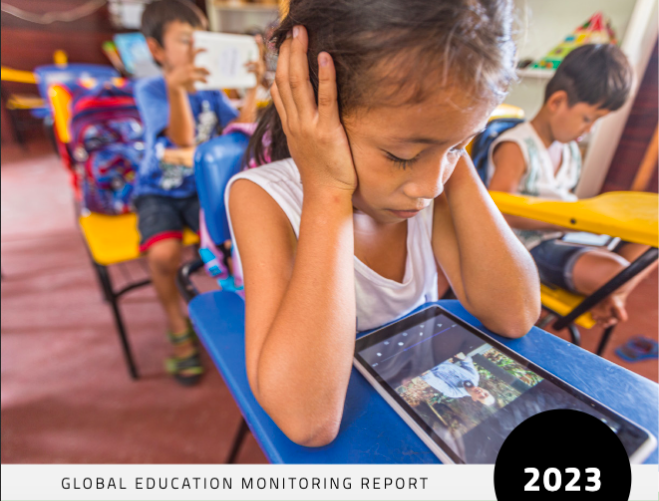The 2023 Global Education Monitoring Report launched last week at an event in Montevideo, Uruguay, hosted by UNESCO, the Ministry of Education and Culture of Uruguay and Ceibal Foundation with 18 ministers of education from around the world. It proposes four questions that policymakers and educational stakeholders should reflect upon as technology is being deployed in education:

Is it appropriate?
Using technology can improve some types of learning in some contexts. The report cites evidence showing that learning benefits disappear if technology is used in excess or in the absence of a qualified teacher. For example, distributing computers to students does not improve learning if teachers are not involved in the pedagogical experience. Smartphones in schools have also proven to be a distraction to learning, yet fewer than a quarter of countries ban their use in schools.
“We need to learn about our past mistakes when using technology in education so that we do not repeat them in the future,” said Manos Antoninis, Director of the Report. “We need to teach children to live both with and without technology; to take what they need from the abundance of information, but to ignore what is not necessary; to let technology support, but never supplant human interactions in teaching and learning.”
Learning inequities between students widen when instruction is exclusively remote and online content is not always context appropriate. A study of open educational resource collections found that nearly 90% of higher education online repositories were created either in Europe or in North America; 92% of the material in the Open Educational Resources Commons global library is in English.
Is it equitable?
During the COVID-19 pandemic, the rapid shift to online learning left out at least half a billion students worldwide, mostly affecting the poorest and those in rural areas. The report underlines that the right to education is increasingly synonymous with the right to meaningful connectivity, yet one in four primary schools do not have electricity. It calls for all countries to set benchmarks for connecting schools to the internet between now and 2030 and for the focus to remain on the most marginalized.
Is it scalable?
Sound, rigorous and impartial evidence of technology’s added value in learning is needed more than ever, but is lacking. Most evidence comes from the United States, where the What Works Clearinghouse pointed out that less than 2% of education interventions assessed had ‘strong or moderate evidence of effectiveness’. When the evidence only comes from the technology companies themselves, there is a risk it may be biased.
Source: https://www.eschoolnews.com/innovation-insights/2023/08/03/number-crunch-august-23/


